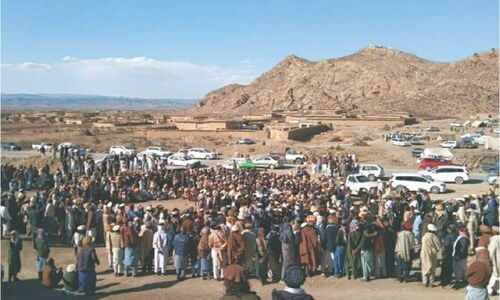MARDAN: The two-day international conference on ‘Nato drawdown from Afghanistan, opportunities and challenges’ concluded here on Thursday with local and foreign experts expressing their views on the topic in detail.
The event was organised by the Department of Political Science at the Abdul Wali Khan University Mardan.
In the first session of the concluding day, speakers included Professor Sarfraz Khan, Professor Anatol Lieven and Professor Manzoor Afridi.
Speaking on the ‘Post-2014 Afghanistan and its impacts on security and governance of Fata/Khyber Pakhtunkhwa and Balochistan,’ Professor Sarfraz Khan said the menace of militancy and terrorism led to the emergence of new terminologies like IDPs and EDPs in the region.
He said of the total of seven tribal agencies, four had been cleared from militants by the Pakistan Army.
While speaking on the topic ‘Dilemmas of US Global Order,’ Professor Anatol Lieven said the US had not planned the invasion of Afghanistan and instead, it was a reaction of the 9/11 terrorist attacks.
He said the Afghan National Army was the same as it was in 1989.
Dr Manzoor Afridi spoke on ‘Power Interest and Rivalry of Major Powers (USA, Russia and China) in Central Asia’ and said after the disintegration of the USSR, the Central Asian States became very important.
He added that due to that importance, big powers like the US, Russia and China wanted to exploit the importance of Central Asian States in one way or the other way.
Vice-Chancellor of University of Swabi Professor Noor Jehan said, “If we look at all of it, we come to know that it’s the game of natural resources: One wanting to have a hold on the other’s resources and so on.”
On the occasion, tribal area expert Mahmood Shah spoke on ‘Post 2014 scenarios in Afghanistan and its impact on Fata/Khyber Pakhtunkhwa.
Dr Ahsan spoke on ‘Peace Education on the Eve of Nato Drawdown,’ Professor Ijaz Khan on ‘The New Chinese Pro Active Foreign Policy and the Region: Opportunities and Challenges in the Changing Regional Geo-Strategic Scene,’ Dr Jan Sartaj on ‘Post Withdrawal of Nato and US forces and the role of Shanghai Cooperation Organisation in Afghanistan,’ Saima Parveen on ‘Post 2014 Spillover Effects of Afghanistan’s Crisis on Pakistan’s Foreign Policy,’ Hikmat Afridi on ‘Nato Drawdown, threat scenario in Afghanistan and its implications for Pakistan & Central Asia’ and Naseer Ahmad on ‘South Asian Security and Stability and Regional Rivalries: Post 9/11 India-Pak Proxy War in Afghanistan.’
At the conclusion of the conference, shields and certificates were distributed among speakers.
Published in Dawn, May 22nd, 2015
On a mobile phone? Get the Dawn Mobile App: Apple Store | Google Play













































Dear visitor, the comments section is undergoing an overhaul and will return soon.